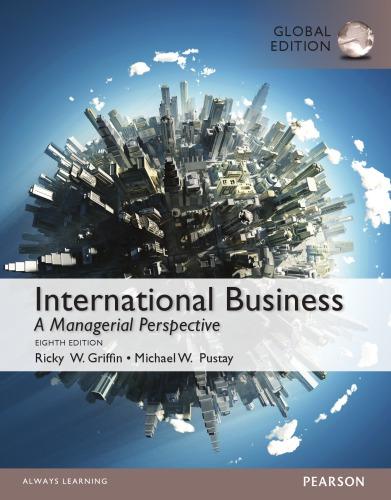P4-4. The IRS lawyers argued that the appeals court ruling amounted to a blueprint for the evasion
Question:
P4-4. The IRS lawyers argued that the appeals court ruling amounted to a “blueprint for the evasion of U.S.
taxes. [It] . . . creates substantial tax incentives for United States corporations to encourage or to endure the adoption of profitable foreign ‘legal restrictions’
that ‘require’ such corporations to avoid United States taxation.” Do you agree with the IRS position?
Or is it just being a crybaby because it lost? Between the years 1979 and 1981 Saudi Arabia had a major disagreement with the other members of the Organization of Petroleum Exporting Countries (OPEC) about the appropriate price to charge for a barrel of crude oil. So-called OPEC hawks wanted to keep the price of oil high. Saudi Arabia, fearful that high prices would encourage other countries to explore for new, low-cost oil fields and stimulate consumers to conserve on energy usage, believed the most profitable long-run strategy was to keep prices low. The Saudis’ actions resulted in the creation of the “Aramco advantage,” and the world’s largest tax refund involving transfer pricing.
Aramco was a consortium of four U.S. oil companies—
Chevron, Exxon, Mobil, and Texaco—that originally controlled the Saudi oil fields. (Exxon and Mobil have subsequently merged, as have Chevron and Texaco.) After its oil reserves were expropriated by the Saudi government in the 1970s, Aramco continued to play a major role in marketing Saudi oil. The Aramco advantage began in January 1979 when Ahmed Zaki Yamani, the Saudi oil minister, wrote a letter to Aramco forbidding it to sell Saudi oil for more than the price set by Yamani’s ministry. This price was well below the world market price for crude oil. The Aramco partners, not wishing to displease the Saudi government, dutifully complied with Yamani’s request. They sold the crude oil to their foreign refineries at Yamani’s price and then refined the oil into gasoline, diesel fuel, and other petroleum products.
Yamani’s directive, however, covered only the price of crude oil. Each company was free to sell the refined products at their market prices, which the four companies did. Because they were buying the crude oil at less than the market price, the refining operations of the Aramco partners were soon making money hand over fist. (In case you are wondering, Yamani was not ignorant of the impact of his letter. He had numerous political reasons for his actions.)
Step by Step Answer:

International Business A Managerial Perspective
ISBN: 9781292018218
8th Global Edition
Authors: Ricky W. Griffin, Michael Pustay





